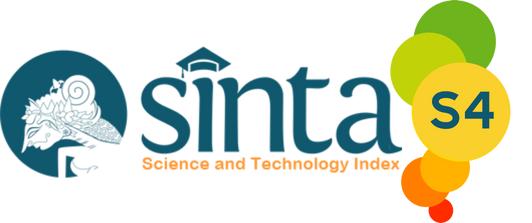Analysis The Response of Junior High School Students In Makassar City to The Science Teaching Module
DOI:
https://doi.org/10.29303/goescienceed.v5i4.596Keywords:
Students, Science teaching module and Ministry of Education and CultureAbstract
The objectives of this study are describing to 1) Students of SMP IT Mutiara response to the use of Science Teaching Module, 2) Students of SMP Muhammadiyah Makassar response to the use of Science Teaching Module, 3) All Students response to the Science Teaching Module. This research used a quantitative approach using a descriptive methodology. The population are students of SMP IT Mutiara IT and SMP Muhammadiyah Makassar registered in the 2022–2025 academic year who use scientific teaching modules provided by the Ministry of Education and Culture are the research population. This research used random sampling techniques. The data was collected by questionnaire. The results of this study showed that 1) The response of students at SMP IT Mutiara to the science teaching module are 20% in very good category, 61% in good category, 16% in moderate category 2) The response of students at Muhammadiyah Makassar to the science teaching module are 34% in very good category, 37% in good category, 7% in moderate category and 12% in bad category 3) The response of All students in both school in this research are 27% in very good category, 49% in good category, 17% in moderate category, and 8% in bad category.
References
Adelina, S., Hasbi, I. & Budi, H. (2024). Pengembangan Modul Ipa Berbasis Sains Islam Pada Materi Klasifikasi Makhluk Hidup Kelas Vii. Jurnal Pendidikan Guru. Vol 5 (2). 178-196.
Hamza, A. (2019) Metode Penelitian & Pengembangan (Research & Development). 2nd ed. Malang: CV. Literasi Nusantara Abadi.
Kalemben, S., Rumahorbo, B. T., & Siallagan, J. (2018). Pengembangan Modul Ipa Terpadu Berbasis Inkuiri Terbimbing Untuk Meningkatkan Keterampilan Proses Sains, Minat, Dan Hasil Belajar Siswa Pada Materi Fotosintesis Di Kelas Viii Smp Negeri 9 Jayapura. Jurnal Ilmu Pendidikan Indonesia, 6(3), 62–70. https://doi.org/10.31957/jipi.v6i3.603
Kemendikbud.2022/2023. Modul Ajar Kurikulum Merdeka Belajar. https://pelatihan.uny.ac.id/materi/modul-ajar/2022
Kemendikbud. (2022). Merdeka Mengajar. Https://Guru.Kemdikbud.Go.Id/.
Khoirudin, M. (2019). Pengembangan Modul Pembelajaran IPA Biologi Berbasis Scientific Approach Terintegrasi Nilai Keislaman Pada Materi Interaksi Antar Makhluk HidupDengan Lingkungan. IJIS Edu: Indonesian Journal of Integrated Science Education, 1(1), 33-42. http://dx.doi.org/10.29300/ijisedu.v1i1.1403
Merriam, S. B. (2009). Qualitative Research: A Guide to Design and Implementation (3rd ed.). Jossey-Bass.
Mubarok, T., Saifudin, A., & Rofiah, S. (2020). Pengembangan Modul Pembelajaran Berbasis Kontekstual Untuk Meningkatkan Kemampuan Pronunciation Mahasiswa Pendidikan Bahasa Inggris. Briliant: Jurnal Riset dan Konseptual, 5(1), 36-43. http://dx.doi.org/10.28926/briliant.v5i1.416
Ramdhan,M. (2021). Metode Penelitian. Surabaya: Cipta Media Nusantara (CMN).
Rumansyah, M. (2016). Perbedaan Pengaruh Pembelajaran dengan Menggunakan Modul Interaktif dan Modul Konvensional terhadap Pemahaman Konsep IPA. Jurnal Pendidikan Matematika dan Sains. 4 (1). 54-62.
Samples, B. (2002). Revolusi Belajar Untuk Anak: Panduan Belajar Sambil Bermain Untuk Membuka Pikiran Anak-Anak And, Terj. Rahmani Astuti. Bandung: Kaifa
Samsu. (2017). Metode Penelitian: (Teori dan Aplikasi Penelitian Kualitatif, Kuantitatif, Mixed Methods, Serta Research & Development). Pusaka.
Sekaran, U., & Bougie, R. (2016). Research Methods for Business: A Skill-Building Approach(7th ed.). Wiley.
Slamet, R. & Wahyuningsih, S. (2022). Validitas dan Reliabilitas terhadap Instrumen Kepuasan Kerja. Jurnal Manajemen dan Bisnis. Vol 17 (2).
Sugiono. (2013). Metode Penelitian Kuantitatif, Kualitatif dan R&D. CV. Alfabeta.
Downloads
Published
How to Cite
Issue
Section
License
Copyright (c) 2024 Jurnal Pendidikan, Sains, Geologi dan Geofisika (GeoScienceed)

This work is licensed under a Creative Commons Attribution-ShareAlike 4.0 International License.







